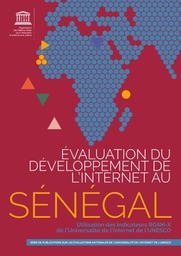The global crisis linked to the COVID-19 pandemic underlines how crucial it is for our societies to have access to information and to the Internet in order to strengthen their resilience in the face of the multiple challenges.
In this context, Benin, Senegal and Kenya have completed voluntarily their national assessment of Internet Universality Indicators (IUI), offering a panoramic picture of the Internet ecosystem in these countries and paving the way for similar assessments in other countries, notably in Africa. These three reports will be launched among a total of 21 countries that are undertaking IUI assessments at the forthcoming Internet Governance Forum 2020 via the UNESCO pre-event on 2 November.
It is my hope that the insights and recommendations contained in this report will trigger fruitful policy discussion on possible actions to be implemented, and thus contribute to highlighting the relevance of the principles of Internet Universality for sustainable development in Africa.
Benin, Senegal and Kenya are, respectively, the 2nd, 3rd and 4th editions of the UNESCO Series of national assessments of Indicators of the Universality of Internet, following the 1st edition for Brazil. The Internet Universality Indicators framework consists of a set of 303 indicators including 109 core ones that aim to assess how well national stakeholders, including governments, companies and civil society perform in adhering to the ROAM principles of Rights, Openness, Accessibility and Multi-stakeholder participation, as well as a number of 79 cross-cutting indicators concerning gender equality, youth, ethical dimensions and sustainable development.
All these national assessment processes examined 109 core indicators and are characterized by a truly inclusive multistakeholder approach. They all started by putting in place the national Multistakeholder Advisory Board to guide and actively support researchers in the completion of the assessment reports, formulating actionable policy recommendations; and organizing a national validation multistakeholder to finalize the entire process. The forthcoming tasks for national stakeholders are to take these recommendations forward to achieve evidence-based policy reform and improvement in the countries.
The completion of this report in Benin has revealed the need for a reliable instrument for decision-making and steering the reform of the digital sector. It is, therefore, a valuable and timely working tool that UNESCO is providing to our States, with Benin as a pioneer. It will undoubtedly facilitate the implementation of the courageous reforms undertaken by the Government of Benin, which has decided to make digital technology one of the main levers for the acceleration of growth and the balanced development of the national territory.
Regarding recommendations relating to online rights in Senegal, the government is urged to ensure the effectiveness of online privacy protection mechanisms by strengthening the missions (regulation of the collection, storage, sharing and transmission of personal data), technical means and human resources (in terms of online privacy protection specialists) of the Personal Data Commission.
Grace Githaiga and Victor Kapiyo, the lead researchers on the Kenya IUIs report, declared “The Kenya ICT Action Network (KICTANet) considers this publication yet another milestone and hopes that it shall be a useful contribution to the development of sound policy, legal, regulatory and technical approaches and responses that shall ultimately promote the development of the ICT sector in Kenya.”
Several other reports are in the pipeline to complete the publication series of Internet Universality National Assessments.
Downloads
Benin |
 |
Kenya |
 |
Senegal |
For more information, see: https://en.unesco.org/internet-universality-indicators

